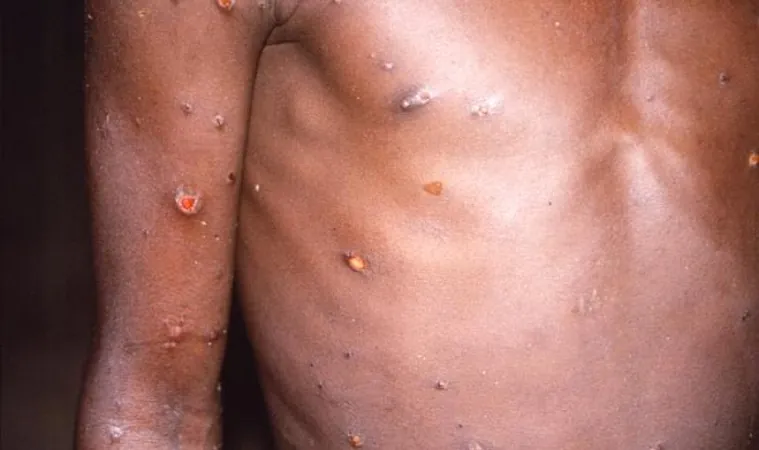
Alarming Rise of Mpox-Measles Co-Infections in DRC Sparks Concern Among Health Officials
2024-10-25
Author: Wei Ling
Alarming Rise of Mpox-Measles Co-Infections in DRC Sparks Concern Among Health Officials
Mpox continues to present a formidable challenge across Africa, with areas like the Democratic Republic of the Congo (DRC) facing significant hurdles. Health officials from the Africa Centres for Disease Control and Prevention (Africa CDC) have recently reported a worrying increase in mpox-measles co-infections among children in the DRC's South Kivu and North Kivu provinces.
Low Vaccination Coverage Holds Dangerous Consequences
Dr. Ngashi Ngongo, head of the Africa CDC's mpox incident management team, indicated that suspected cases of measles have surged in South Kivu since early May, with a similar escalation in North Kivu. The primary driving factor? Alarmingly low rates of measles vaccination. Dr. Ngongo emphasized that many children remain unvaccinated, putting them at an increased risk for both measles and mpox, particularly in treatment centers battling these outbreaks.
The situation takes on a graver tone, with the majority of these infections occurring in children under the age of 15. This demographic is particularly susceptible to the dual threats posed by these diseases. Compounding the problem are high rates of childhood malnutrition, which can severely impact immune responses and predispose young patients to dreadful health outcomes.
Statistics Reveal a Deepening Crisis
In just one week, the DRC reported 2,729 new mpox cases, 1,001 of which were confirmed through laboratory testing, as well as 26 new fatalities associated with infections. Strikingly, the combined cases from the DRC and nearby Burundi accounted for an overwhelming 96% of reported incidents within that timeframe. This year alone, the region has seen 45,327 cases, culminating in 1,014 deaths.
Dr. Ngongo noted that neighboring countries such as Liberia, Kenya, and Uganda are also experiencing rising case numbers, intensifying concerns over the regional health crisis.
Glimmers of Hope Amidst the Challenges
Despite the grim statistics, there are signs of hope. Notably, five of the 18 affected countries—Cameroon, Gabon, Guinea, Rwanda, and South Africa—have not reported any confirmed cases in four weeks. Furthermore, testing rates are on the rise, signaling improvements in health system capacities and training for sample management. However, challenges with contact tracing continue to hinder progress.
The response to the outbreak has been bolstered by high levels of acceptance of the mpox vaccine among affected communities, particularly in crowded environments like prisons and internally displaced persons camps in the DRC and Rwanda. A vaccination campaign is set to commence in Kinshasa on November 5, with Nigeria also preparing to launch its vaccination efforts on October 29 after delays.
So far, the region has secured 5.6 million doses of mpox vaccine, comprising 2.57 million doses of Bavarian Nordic's Jynneos vaccine and 3 million doses of the LC-16 vaccine from Japan. The ongoing vaccination efforts offer a pathway to mitigate the impact of mpox and reduce the risks of co-infections with measles.
Urgent Call to Action
As the DRC grapples with these alarming co-infections, health officials urge for immediate action to increase vaccination coverage and bolster nutritional support for children. The public health stakes could not be higher, and efforts to combat this dual challenge will require unprecedented collaboration and commitment from local and international partners. The health community is poised for an uphill battle, but with focused interventions, it is possible to turn the tide against this crisis.



 Brasil (PT)
Brasil (PT)
 Canada (EN)
Canada (EN)
 Chile (ES)
Chile (ES)
 España (ES)
España (ES)
 France (FR)
France (FR)
 Hong Kong (EN)
Hong Kong (EN)
 Italia (IT)
Italia (IT)
 日本 (JA)
日本 (JA)
 Magyarország (HU)
Magyarország (HU)
 Norge (NO)
Norge (NO)
 Polska (PL)
Polska (PL)
 Schweiz (DE)
Schweiz (DE)
 Singapore (EN)
Singapore (EN)
 Sverige (SV)
Sverige (SV)
 Suomi (FI)
Suomi (FI)
 Türkiye (TR)
Türkiye (TR)